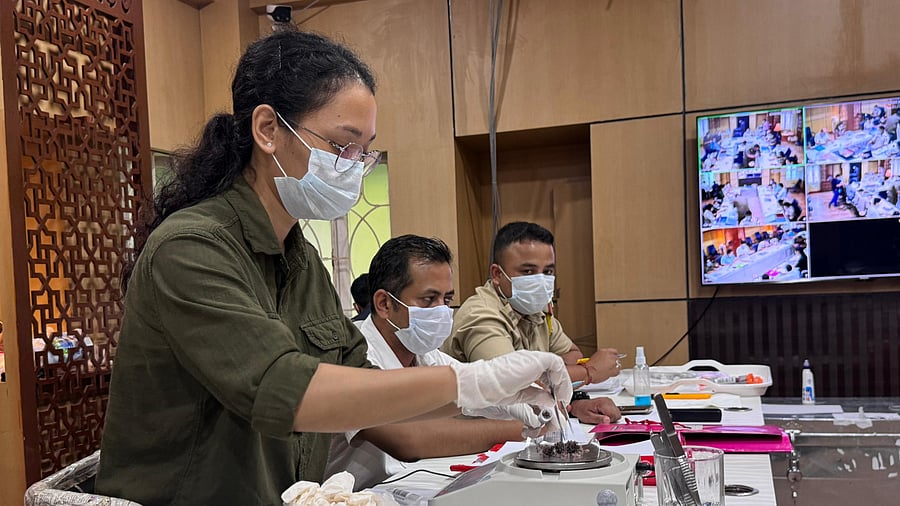
Most of the horns were either recovered from poachers or collected after natural or accidental deaths.
Credit: Kaziranga National Park.
Guwahati: The forest department in Assam has started the process for DNA profiling of over 2,500 rhino horns, most of which were burnt in 2021 to bust the myths about medicinal values of the horns that aids poaching.
A total of 2,623 horns were reconciled of which 2,479 were burnt in public in September 2021.
Most of these horns were either recovered from poachers or collected after natural or accidental deaths in the state's forests.
A small quantity of the samples from each horn was retained for undertaking the genetic and chemical studies which can aid better management of the current rhino population.
The process for DNA profiling of the rhino horns began at Kaziranga National Park, the largest home for the prized one-horned rhinos, between July 1 and 8. Specialised teams collected the samples as per the protocols and in the presence of independent observers.
"The team verified each of the 2,573 samples stored and repackaged them in small vials to be transported to the genetic laboratory at Wildlife Institute of India. A few of the samples are also stored for chemical analysis of the horns and these will be taken up later," Kaziranga National Park authorities said in a statement.
Assam is home to 80 per cent of the global population of one-horned rhinos and the nearly 1,300 square kilometer Kaziranga alone houses 70 per cent (2,613 in 2022). India's rhino population surged approximately by 170 per cent since the 1980s - from 1,500 then to over 4,014 in 2024.
Investigation and conservation
The aim of the analysis is to document the individual DNA profiles of the rhino horn and add it to the RhoDIS India DNA data library. "Further analysis will also help identify if any changes have taken place to the STR allele frequency over the years since the stocking of the horns from different parts of Assam," it further said.
RhODIS or the Rhino DNA Index System, is a wildlife forensics tool that was specially developed for investigating wildlife crime cases by comparing the confiscated rhino horns with the database.
The DNA analysis of the horn stockpile samples will be done in the WII genetics laboratory, which is responsible for the RhoDIS India program genetic analysis.
Udayan Borthakur, who heads the wildlife genetic division of Aaranyak, a biodiversity conservation group in Assam, told DH that this will help develop both a forensic DNA database of rhino horns that were in the repository of Assam government since 1970 and help understand changes in genetic diversity of the species over time.
"This is crucial for wildlife crime investigations as well as management and conservation planning of the natural population in the future."